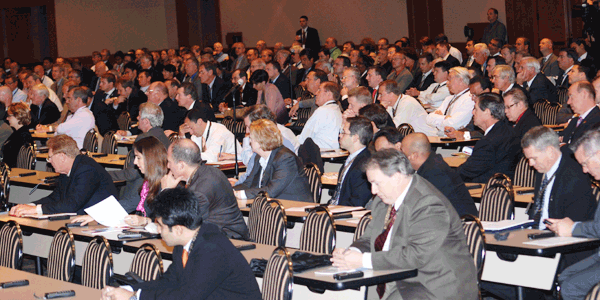|
|
|
FLASHBACK: The International
Air Cargo Association's vision of creating a
neutral forum for stimulating discussions and
solutions among all segments of the air cargo
industry has created a biennial event recognized
internationally as the world's premier air cargo
event. The 2006 edition WAS held in Calgary,
Canada, September 12-14. Attendees at ACF events in
Bilbao, Hong Kong, Paris, Washington and other
crossroads of international commerce since 1962
have not come "simply to do business." They
gather
biennially to analyze the state of the industry;
discuss its problems challenges; and network
together to solve problems and maximize
opportunities. Discussions and decisions made at
biennial Air Cargo Forums are far reaching only
into the commercial world but into governmental
policy making as well as academia. Boeing Forecast Sees Air
Cargo Strength Continuing - Industry Will
Rely Increasingly on Large Freighters SEATTLE: The global
air cargo market, currently showing significant
strength through a flurry of new freighter orders,
is poised for strong 20-year growth, during which
The Boeing Company forecasts that the world
freighter airplane fleet will double from 1,760 to
3,530 airplanes. This is a key
finding in the latest Current Market Outlook,
recently produced by Boeing and available on its
Web site. According to the
Current Market Outlook 2005, issued annually by
Boeing Commercial Airplanes, 2,870 freighters will
enter the fleet by 2024 and 1,100 cargo airplanes
will be retired, for a net gain of 1,770
airplanes. Freighters of all
sizes will provide more than half of the world's
total air cargo capacity, a slight increase from
today, although as a percentage of the total world
airplane fleet, freighters will decrease from 10.5
percent to 10 percent, due to an increase in size
of the average freighter. "The overall
forecast is slightly higher than last year's
forecast, with about 100 more airplanes entering
the fleet than we projected previously," said Jim
Edgar, regional director, Cargo Marketing for Asia.
"Carriers also are looking increasingly to large
freighters, especially the 747 and 777 models, for
optimal efficiency and range." The share of
widebody freighters is expected to increase to 64
percent of the fleet, compared to 47 percent
currently. About 60 percent of the freighters that
will be added to the fleet will be widebody
airplanes. The share of
standard-body freighters will decrease from 53
percent to 36 percent over the next two decades,
partially due to preferences by operators such as
express carriers for medium widebodies as a
replacement for retiring standard-body
freighters. By 2024, 720 new
production freighters will enter the fleet, about
25 percent of the total growth, with the remainder
being conversions from passenger and combi
airplanes. Although new airplanes will make up a
minority of the world freighter fleet, many
airlines prefer the technical advantages,
reliability, and fuel efficiency of new airplanes.
Half of these new airplanes will be in the large
freighter category (greater than 65
tons). "In 2004, we saw
the completion of the post-9/11 recovery period
with a year of unprecedented growth," said Tom
Crabtree, Boeing regional director, Cargo Marketing
for Europe and Russia. "While that growth can't be
sustained on a continuing basis, it provides a good
basis for the long-term growth that is indicated by
the available data. "Thus far in 2005,
growth certainly has slowed, which isn't surprising
considering the 2004 growth levels." The value of the
new production freighters entering the market over
the 20-year period totals $155 billion, an increase
over the previous Boeing forecast, again due to the
increasing reliance on larger airplanes. |


 Hosts
2006 Air Cargo Forum and Exposition
Hosts
2006 Air Cargo Forum and Exposition